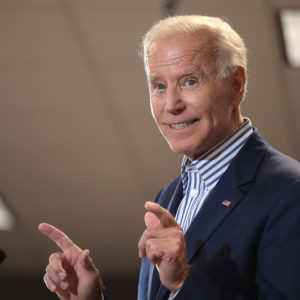The Joe Biden presidency has been pretty tough on Peach State.
Last week, he urged Major League Baseball to strip Atlanta of the All-Star game — and the $100 million tourism dollars that go with it — over a new election law he calls “Jim Crow on steroids.” The league took his advice and announced the event will be moved to a yet-to-be-determined location in another state.
It was a move so harmful to the local (and largely African-American) economy that even Democratic activist Stacy Abrams urged MLB not to do it.
Now Biden may deal Georgia workers another blow by refusing to step in on a trade dispute that imperils a $2.6 billion electric car battery manufacturing plant expected to employ 2,600 people.
Georgia Gov. Brian Kemp and other Republicans are asking the Biden administration to overturn a ruling from the International Trade Commission that found SK Innovation guilty of stealing 22 trade secrets from rival LG Energy Solutions. The two South Korean companies have waged a trade war since 2019 when SK hired away engineers in Seoul, a not uncommon move in tech industries. LG claimed the engineers violated noncompete agreements and opted for the “nuclear option” of appealing to the ITC.
That ruling would leave Commerce, Ga. in the lurch. SK broke ground on the plant in March, 2019 with the expectation that it would be operational by next year. Georgia ponied up $300 million in tax incentives to bring thousands of green tech jobs to the state. But the commission’s ruling bans the company from importing the components that would be used to manufacture the batteries.
“The Commerce plant fits squarely into your publicly announced goal of electrification of the U.S. auto fleet with good, high paying jobs for local workers,” Kemp wrote to Pres. Joe Biden. “Furthermore, your recently announced Executive Order on supply chains recognized the critical role of EV batteries to our economy and national security. Given that China is currently the leading producer of EV batteries, closing the Commerce, Georgia, plant will result in the United States falling further behind China in the global EV battery race.”
Kemp’s letter points to a precedent set by Biden’s former boss, Pres. Barack Obama, who overturned a 2013 commission ruling that pitted Apple against Samsung. Obama vetoed the ruling that would have banned some older models of iPhones and iPads in a move Apple cheered and Samsung jeered.
Former United Nations Ambassador Andrew Young and Georgia Department of Economic Development Commissioner Pat Wilson made the same point in a recent op-ed urging Biden to act.
“President Joe Biden has the ability to cancel the ITC’s ruling and send the two companies back to the negotiating table so we can all drive an electric Ford-150 or Volkswagen made right here in Georgia,” they wrote. “Georgia is forward-looking and is seizing on our clean energy future. Backing out now would be wrong. This isn’t a partisan issue, and the consequences for Georgia and the country are significant.”
Despite the authors’ claims the issue isn’t partisan, Georgia Democrats have been notably subdued in their public statements while Peach State Republicans have publicly urged Biden to intervene. It could reflect the bind the Biden administration finds itself in dealing with two large companies with major investments in the U.S. LG has a battery plant in Michigan, is close to completing a cell manufacturing plant in Ohio, and has pledged at least $4.5 billion in new investments in the U.S. by 2025.
As a result, Michigan and Ohio lawmakers are urging Biden to stay out of the ITC fight. Ohio Gov. Mike DeWine, for example, has been urging the ITC to act for months. Now that it has, he said in a letter to the Biden administration, “LG Chem’s stolen intellectual property should not be used to directly compete against Ohio workers at the new factory or the Ohio- and Michigan-based businesses in the factory’s supply chain.”
Neither Democratic Sens. Jon Ossoff’s or Raphael Warnock’s office replied to a request for comment. But Warnock has previously told the press he has spoken with the Biden administration and hopes a deal can be reached. “I am working to make sure Georgians will benefit from the jobs they were promised.”
But can Georgia compete politically with midwestern states like Michigan where Democrats have tended to fare far better in elections? It’s true Biden carried Georgia and the state just elected two Democratic Senators. It’s also true Republican Donald Trump carried Michigan in 2016.
Historically speaking, however, those wins could be flukes. Biden’s the first Democrat to carry Georgia since 1992 and Michigan hadn’t backed a Republican since 1988. It’s possible Biden, who strongly identifies with the industrial Midwest, may decide the smart move is to stick with the Rust Belt over the Sun Belt. This may explain why his Democratic allies in Georgia aren’t speaking out more forcefully.
Last week, SK Innovation raised the stakes by saying it could pull its battery business out of the United States entirely if President Biden does not overturn the trade panel’s decision against it by April 11.
If the Biden White House does allow the ITC ruling to take effect, it would be the second high-profile blow to Georgia’s economy in as many weeks. Now some Democrats are beginning to second-guess the wisdom of MLB’s All-Star move. Warnock, who will face voters next year, may be caught in a squeeze play that could put him back on the political bench.

